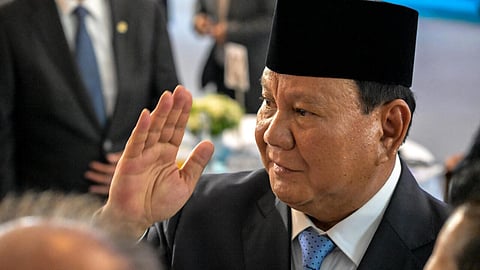
- NEWS
- the EDIT
- COMMENTARY
- BUSINESS
- LIFE
- SHOW
- ACTION
- GLOBAL GOALS
- SNAPS
- DYARYO TIRADA
- MORE

JAKARTA, Indonesia (AFP) — Wearing a traditional Indonesian black hat and shirt, President Prabowo Subianto speaks to the camera in an Instagram video, asking his people how he can help them after his election last year.
“Who hasn’t received aid from me? What are your needs right now?” Prabowo appears to ask viewers in the clip posted in November.
But while the Indonesian leader’s mouth moves and his eyes blink, the words he utters are part of a fraudulent deepfake scam uncovered by police last month that has swindled Indonesians across 20 provinces.
Those ensnared by the message were asked to contact a WhatsApp number and hand over between 250,000 and one million rupiah ($15-$60) as an “administrative fee” to get aid that never materialized.
Since last year’s Indonesian election, experts have warned of a tidal wave of deepfakes — audio, images and video appearing to come from a known person but which are in fact the work of scammers using artificial intelligence tools.
And victims say the hoaxes are so sophisticated they leave others vulnerable to being conned, too.
“People should be more careful. Don’t be easily fooled by the lure of prizes,” said Aryani, 56, who handed over 200,000 rupiah to fraudsters after seeing a deepfake video of a prominent Indonesian businessman.
“I need money, but instead I’m asked to send money. They even made video calls with me, as if I were talking directly to them.”
During the Southeast Asian country’s presidential campaign, deepfakes became a prominent tool to spread misinformation both harmful and helpful to candidates.
But now that technology has fallen into the hands of criminals looking to make cold, hard cash.
Agence France-Presse’s (AFP) fact-checkers found the account behind the Prabowo clip has posted dozens of similar videos appearing to show various high-profile figures, including Indonesian Vice President Gibran Rakabuming Raka.
Those videos also promote the bogus financial aid.
Police arrested a suspect who pocketed 65 million rupiah ($4,000) from the scam, Himawan Bayu Aji, director of the Indonesian National Cyber Crime Unit told reporters in February.
He said officers detained a second person involved in another scam that also used deepfake technology, without disclosing the amount raised.
AFP Fact Check’s investigation found the spread of such videos had a much wider reach than the two accounts that police announced.
